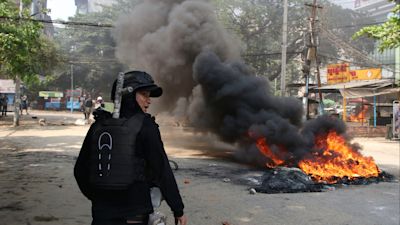Myanmar protests continue after more than 100 killed in bloodiest day since coup

Video report by ITV News Senior Correspondent Paul Davies
Protesters returned to the streets of Myanmar on Sunday to press their demands for a return to democracy, just a day after security forces killed more than 100 people in the bloodiest day since last month’s military coup.
Demonstrations were held in Yangon and Mandalay, the country’s two biggest cities, as well as elsewhere. Some protests were again met with police force.
At least 114 people were killed on Saturday as security forces cracked down on protests against the February 1 coup which ousted Aung San Suu Kyi’s elected government, according to the online news service Myanmar Now.
Several children under 16 were reported to be among the dead.
Similar death tolls were issued by other Myanmar media and researchers, far exceeding the previous highest on March 14.
The number of killings since the coup is now more than 420, according to multiple counts.
The coup reversed years of progress towards democracy after five decades of military rule and has again made Myanmar the focus of international scrutiny.
Saturday’s killings by police and soldiers took place throughout the country as Myanmar’s military celebrated the annual Armed Forces Day holiday with a parade in the country’s capital, Naypyitaw.
The bloodshed quickly drew international condemnation, both from diplomatic missions within Myanmar and from abroad.
UN Secretary-General Antonio Guterres said he was shocked by the killings of civilians, including children.
“The continuing military crackdown is unacceptable and demands a firm, unified & resolute international response,” he wrote on Twitter.
In the United States, Secretary of State Antony Blinken said in a tweet that his country is “horrified by the bloodshed perpetrated by Burmese security forces, showing that the junta will sacrifice the lives of the people to serve the few”.
The military chiefs of 12 nations issued a joint statement condemning the use of force against unarmed people.
“A professional military follows international standards for conduct and is responsible for protecting – not harming – the people it serves,” it said.
“We urge the Myanmar armed forces to cease violence and work to restore respect and credibility with the people of Myanmar that it has lost through its actions.”
The statement was issued by the defence chiefs of Australia, Canada, Germany, Greece, Italy, Japan, Denmark, the Netherlands, New Zealand, South Korea, the United Kingdom and the United States.
Human rights group Amnesty International revived criticism that the international community is not doing enough to end the state violence in Myanmar.
“UN Security Council member states’ continued refusal to meaningfully act against this never-ending horror is contemptible,” said Ming Yu Hah, the organisation’s deputy regional director for campaigns.
The Security Council has condemned the violence but not advocated concerted action against the junta, such as a ban on selling it arms.
China and Russia are both major arms suppliers to Myanmar’s military as well as politically sympathetic, and, as members of the council, would almost certainly veto any such move.
In recent days the junta has portrayed the demonstrators as the ones perpetrating violence for their sporadic use of Molotov cocktails.
On Saturday, some protesters in Yangon were seen carrying bows and arrows.
The junta has said its use of force is justified to stop what it has called rioting.